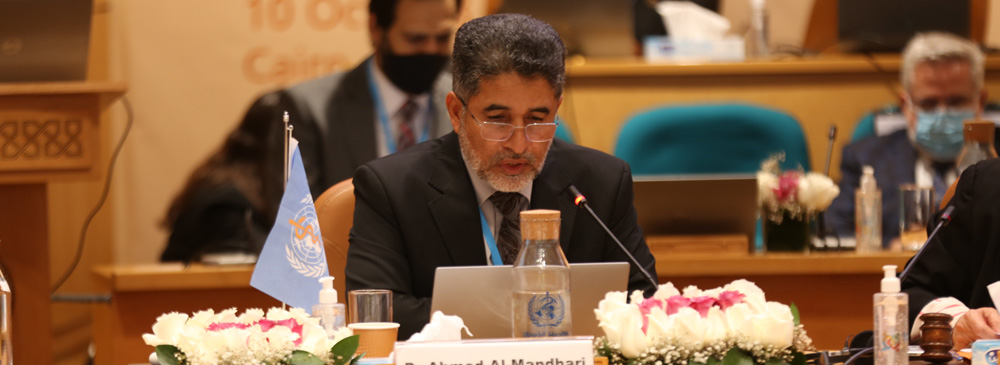
11 October 2022, Cairo ‒ The 69th session of the WHO Regional Committee for the Eastern Mediterranean proceeded with regular sessions today.
Presenting his annual report for 2021, Dr Ahmed Al-Mandhari, WHO Regional Director for the Eastern Mediterranean, underlined how the COVID-19 pandemic has continued to exact a heavy toll, with a total of 28 million cases confirmed and more than 348 000 deaths reported across the Region by October 2022, amid widespread disruption to health services, economies and communities.
Dr Al-Mandhari also drew attention to how the midterm review of the regional vision Health for All by All “brought the WHO workforce, Member States, partners and external experts together to provide a rigorous assessment of progress towards our four regional strategic priorities – expanding universal health coverage, addressing health emergencies, promoting healthier populations and making transformative changes in WHO ¬– and towards the health-related Sustainable Development Goals.”
During the first regular session, participants elected Dr Mai Al-Kaila, Minister of Health of Palestine, as chair. Iraq’s Minister of Health Dr Hani Mousa Bader, and Lebanon’s Minister of Health Dr Firas Abiad, were elected as vice-chairs.
The session on the technical paper “Building resilient health systems to advance UHC and promote health security in the Eastern Mediterranean Region” began by addressing the challenges posed to health systems by COVID-19, noting the 23 global reviews to date that have identified gaps in health system capacity, mainly in fragile, conflicted-affected and vulnerable settings.
The paper proceeded to set out a regional agenda for advancing towards UHC and health security and itemized the key lessons learned and priorities needed to reshape future health systems.
RC69 attendees also listened to a panel discussion on COVID-19. The COVID-19 pandemic may have slipped from the headlines, said the panelists, but the disease will be with us for a long time to come. Which means that, though we are entering the post-pandemic phase, we must learn to live with COVID-19.
They went on to highlight ongoing challenges, including limited supply chain management capacity, delays in sharing data, underreporting and weaknesses in community engagement. Participants agreed that it is necessary to sustain the COVID-19 response in order to bring the acute phase to an end, and to adapt and integrate systems to manage endemic COVID-19.
Work is also needed to ensure quality care for those with long COVID-19, and to operationalize the lessons learned in order to prevent future pandemics.
In a session titled “Leveraging religious scholars to promote public health”, Dr Yagob Al Mazrou, chairperson of the Islamic Advisory Group (IAG) Executive Committee, outlined the Group’s interventions to support vaccination campaigns and promote public health.
Noting the expansion of IAG’s mandate beyond polio, Dr Al Mazrou gave details of IAG’s social media awareness campaigns dispelling misconceptions related to COVID-19 vaccinations, maternal and child health, and on the spacing of pregnancy. IAG campaigns have reached more than 14 million users.
In the course of a meeting during which members of the Regional Subcommittee for Polio Eradication and Outbreaks in the Eastern Mediterranean reviewed recent developments, Member States and partners reiterated their commitment to freeing current and future generations of children from polio and called for sustained efforts to end polio once and for all, including the pockets of wild poliovirus that linger in Afghanistan and Pakistan.
In the same meeting Dr Hamid Jafari, Director of the Region’s Polio Eradication Programme, briefed Member States on the epidemiological situation in these last two countries with wild poliovirus transmission in the Region.
For more information
Mona Yassin
Communications Officer
WhatsApp: +201006019284








